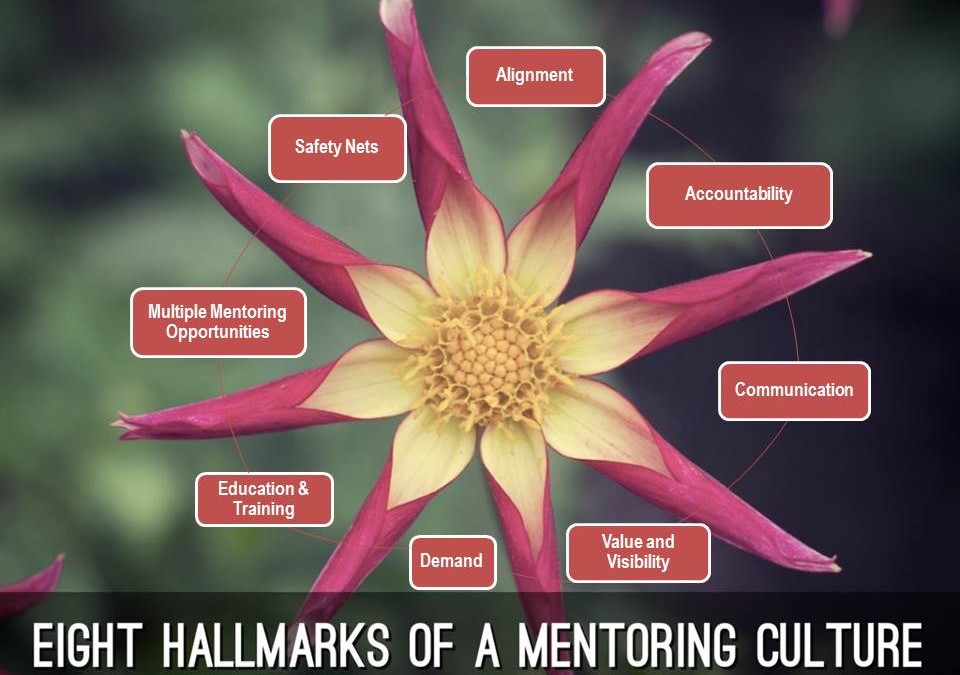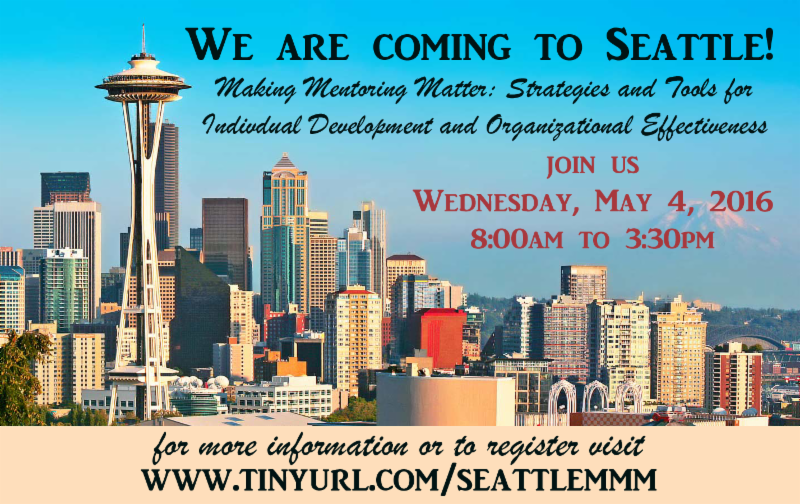
by Center for Mentoring Excellence | Dec 6, 2016 | Facilitating Learning, Mentoring Training
One of the highlights of this past year for us has been working with the Dallas County Community College District (DCCCD) to establish a successful mentoring culture.
DCCCD launched its Network Mentoring Culture in August by convening the Chancellor’s staff and presidents, HR representatives and other college leaders with a primary goal: to create a mentoring culture.
According to George Marquez, DCCCD’s Executive District Director of Talent Development and Division of Talent Central:
“From my perspective, successful employee engagement into the DCCCD system occurs with talent development programs and a mentoring system. We sincerely believe that the mentor component is the strongest bond that we can have in any of our employee programs because mentors provide a safe way to extend the skills and knowledge of employees through encouragement and support. Having a system of mentors also allows us to strengthen our succession planning.”
A kickoff training for Chancellors Fellows and their mentors followed a day-long consultation with DCCCD leaders.
In October we certified 18 DCCCD mentoring workshop facilitators (from seven colleges, across three locations) to conduct Starting Strong: What Mentors Need to Know and Do™ based on the book Starting Strong.

Newly certified DCCCD Starting Strong facilitators.
We were, and continue to be, impressed with the passion, commitment and talented leaders we had the privilege of certifying. Their individual contributions made the certification such a warm and welcoming experience for everyone!

Lory Fischler, Dr. Lois J. Zachary and Lisa Fain presenting their memento.

by Center for Mentoring Excellence | Nov 22, 2016 | Facilitating Learning, Group Mentoring, Growth and Development, Mentoring Training
In September we had the privilege of working with UN Women as it launched its first formal leadership development mentoring program in Cairo, Egypt. Participants from the Ivory Coast, Egypt, Uganda, Moldova, Albania, Liberia, South Africa, Rwanda, New Delhi, Istanbul, Santo Domingo, Panama, Brussels, Copenhagen and Geneva joined us for the mentoring kickoff training.
UN Women mentees volunteered for this global initiative for a variety of reasons: They were looking to invest in their own development and take their leadership to the next level. They wanted career guidance. And they wanted candid, safe feedback. These were the things they worked on — things that would really matter!
Like other mentees we’ve worked with, this team came to mentoring with the very same concerns and questions. They wondered:
- Will I be worthy of a senior leader’s time?
- Will I be able to accomplish enough during their mentoring timetable to make the investment valuable?
- Will I feel comfortable and be able to build trust with a leader I don’t know?
- Will the feedback I receive be confidential and useful?
- Will my mentor have time in their demanding schedule to connect with me?
However, we did find some unique challenges for mentoring pairs in third-world countries, especially when trying to connect across time zones. Poor quality Internet service and gaps in time zones can make communication particularly difficult. Even so, mentoring has been value-added for these mentees, who say they appreciate the support provided by mentors and the opportunity mentoring gives them to reflect on themselves, their development and their future.
UN Women is the United Nations entity that promotes gender equality and the empowerment of women. Its Mentoring Program is designed to grow its workforce by giving mentees access to role models, tapping into networks and increasing visibility. It also helps mentors develop key leadership skills, giving them the opportunity to directly support the next generation of UN Women.


by Center for Mentoring Excellence | Sep 6, 2016 | Facilitating Learning, Growth and Development, Mentoring Communication, Mentoring Training
At first, mentoring and leadership coaching could seem like interchangeable terms for the same training program. However, when you understand the difference between the two methods, you realize, to be a strong leader, you need both. In their simplest forms, mentoring is about building valuable relationships with other people, while leadership coaching programs concentrate on improving performance.
Mentoring is a robust improvement tool customized for personal growth. Mentorship is an efficient way to help people advance in their careers while building meaningful relationships. Typically, it requires two people (a mentor and a mentee) who work in a related field and share professional experiences. Through respect and trust, the two people work together to realize the mentee’s potential and discuss a plan to achieve their goals.
Although mentoring is an essential tool for all professionals, leadership coaching is equally valuable. Through leadership coaching, you have the opportunity to hone your management skills and enhance your performance as a leader. Unlike mentoring, leadership coaching can be completed in a group or individual sessions.
Leadership coaches are often hired from outside your organization and, sometimes, your field. The separation from the company allows the coach to discuss topics and solve problems that could be unsuitable to address with your supervisor.
To make your career goals a reality, you must understand your professional path and continuously improve your performance. The simplest way to enhance your career experience is through strong relationships with a mentor as well as a leadership coach.
The Center for Mentoring Excellence offers the
tools and
training needed to help you achieve your mentoring and leadership goals. Also, we provide a variety of resources to help you strengthen your leadership abilities and boost your team’s productivity. So what are you waiting for?
Contact us today!

by Center for Mentoring Excellence | May 18, 2016 | Mentoring Training
Mentoring at “Ideal Organization” (IO) grew out of a formal program for high potentials. The initial program created such a buzz throughout IO that now, ten years later, its participants are still committed to mentoring others and initiating mentoring opportunities in their own organizations. Several years ago an organizational survey revealed that in addition to one-on-one informal mentoring and formal mentoring programs, multiple groups actively engaged in mentoring (i.e., women’s executive mentoring, technical mentoring, and cross-functional mentoring). Leaders regard mentoring as part of their responsibility to informally mentor employees who show promise. Those charged with managing, supporting and coordinating mentoring efforts at IO monitor progress, measure results and work with teams throughout the organization to integrate mentoring process improvements. In addition, they keep an internal focus on mentoring. They coordinate mentoring efforts to make sure that all mentoring programs align with one another other and with the organization’s culture.
Mentoring at IO is always in motion and constantly creating learning bridges that empower individuals to transform Ideal so that it continues to live up to its name. The leaders at IO worked through a number of steps and phases in developing its mentoring culture. It’s still a work in progress.
Sounds great, yes?
Is your organization committed to making an ongoing investment in mentoring? If you’re serious about mentoring and are committed for the long haul, read on.
A mentoring culture creates a continuum of expectation about mentoring and establishes a standard of excellence for mentoring practice. It also encourages mentoring excellence by continuously creating readiness for mentoring within the organization, facilitating multiple mentoring opportunities, and building in support mechanisms and safety nets to ensure individual and organizational mentoring success.
 What’s more, it:
What’s more, it:
- Establishes ownership for mentoring within the organization
- Promotes shared responsibility
- Maximizes resources
- Maintains integrity
- Facilitates knowledge utilization
- Supports integration of key processes into the organization
- Creates openness to learning through mentoring
- Shortens ramp up time
What are you waiting for? To learn more, purchase your copy of Creating a Mentoring Culture today. It will guide you through each of the eight hallmarks that contribute to creating a vibrant and full mentoring culture.

by Center for Mentoring Excellence | Mar 15, 2016 | Mentoring Training
Mentoring has become a business imperative and a corporate responsibility. (more…)

by Center for Mentoring Excellence | Oct 15, 2015 | Making Mentoring Work For You, Mentoring Training
A vibrant mentoring culture requires a laser focus on and commitment to ongoing mentoring training. Mentoring training, when well executed, is a springboard to organizational mentoring excellence. Here’s what you can do to ensure success:
1. Offer multi-level mentoring training for new, somewhat experienced, and veteran mentees and mentors. The need for mentoring training is ongoing. Targeted training experiences have shown to be most effective.
2. Facilitate regular mentoring roundtables. Roundtables are learning and support sessions that promote active and timely sharing of best mentoring practices among a peer mentoring group (mentee or mentor). Participation in roundtables encourages benchmarking of progress relative to others in the group.
3. Conduct renewal training for experienced and veteran mentors. Renewal training eliminates stagnation in the mentor role by elevating mentoring skills.
4. Prepare mentors to transition to a role as mentee. Transitions are particularly rich teachable moments. It is somewhat challenging when experienced mentors find themselves sitting in the mentee seat and trying to figure out how to function in that role.
5. Develop your organization’s internal mentoring expertise. Train and empower a cadre of mentoring coaches to support mentors and mentees at all levels to become successful at mentoring. Make sure they receive state of the art education and training.
6. Include mentoring training as a key element in your leadership development program. Mentoring is a leadership competency. Every leader should know how to be a mentor, how to find a mentor, how to create good mentoring relationships and how to best support mentoring.








 What’s more, it:
What’s more, it:


